
When Nazanin and Arash, a Persian couple living in London, began planning their wedding, they faced a dilemma familiar to many diaspora families. Their parents expected a traditional Persian celebration with all the ceremonial elements Sofreh Aghd, Aroosi reception, specific timing around sunset while they wanted a destination setting that felt special beyond a London banquet hall. After researching wedding planners across Europe and the Middle East, they chose Ramarossi, an Antalya-based luxury wedding planner with specialized expertise in Persian and Middle Eastern weddings. Their decision reflected a growing pattern: Persian families throughout Europe, the United Kingdom, and North America are selecting Turkey for destination weddings, and increasingly choosing Ramarossi to coordinate these culturally complex celebrations.
Turkey's appeal as a Persian wedding destination stems from multiple factors including geographic proximity to Middle Eastern communities, cultural familiarity that bridges Eastern and Western traditions, stunning Mediterranean venues, and cost advantages compared to European luxury destinations. Ramarossi has coordinated over 100 Persian and Middle Eastern weddings in Antalya and Istanbul since establishing the company over 15 years ago, developing specific expertise that generic destination wedding planners cannot replicate. This specialization combined with Persian language fluency among Ramarossi planners, understanding of ceremonial requirements, and a vendor network experienced in Persian traditions explains why Persian couples consistently select Ramarossi when planning Turkish destination weddings.
The Persian Diaspora Wedding Challenge
Balancing Tradition with Modern Destination Expectations
Persian families living outside Iran face unique wedding planning challenges that couples from other cultural backgrounds may not encounter. First-generation immigrants and second-generation diaspora members often navigate different expectations between parents who prioritize traditional ceremonial elements and couples who envision contemporary destination celebrations. This tension creates planning complexity that requires cultural understanding rather than simple vendor coordination.
Traditional Persian weddings involve specific ceremonial components with deep symbolic meaning.The Sofreh Aghd ceremony table arrangement includes seven items beginning with the letter "seen" in Farsi, along with mirrors, candelabras, decorated eggs, coins, honey, and other symbolic elements. These ceremonial traditions reflect centuries of Persian cultural heritage that require specialized understanding for proper execution.. Each item carries meaning related to fertility, prosperity, brightness, and sweetness in marriage. Assembling these elements correctly requires knowledge beyond Pinterest inspiration boards understanding proper arrangement, appropriate symbolic items for modern couples, and respectful presentation that honors tradition without appearing outdated.
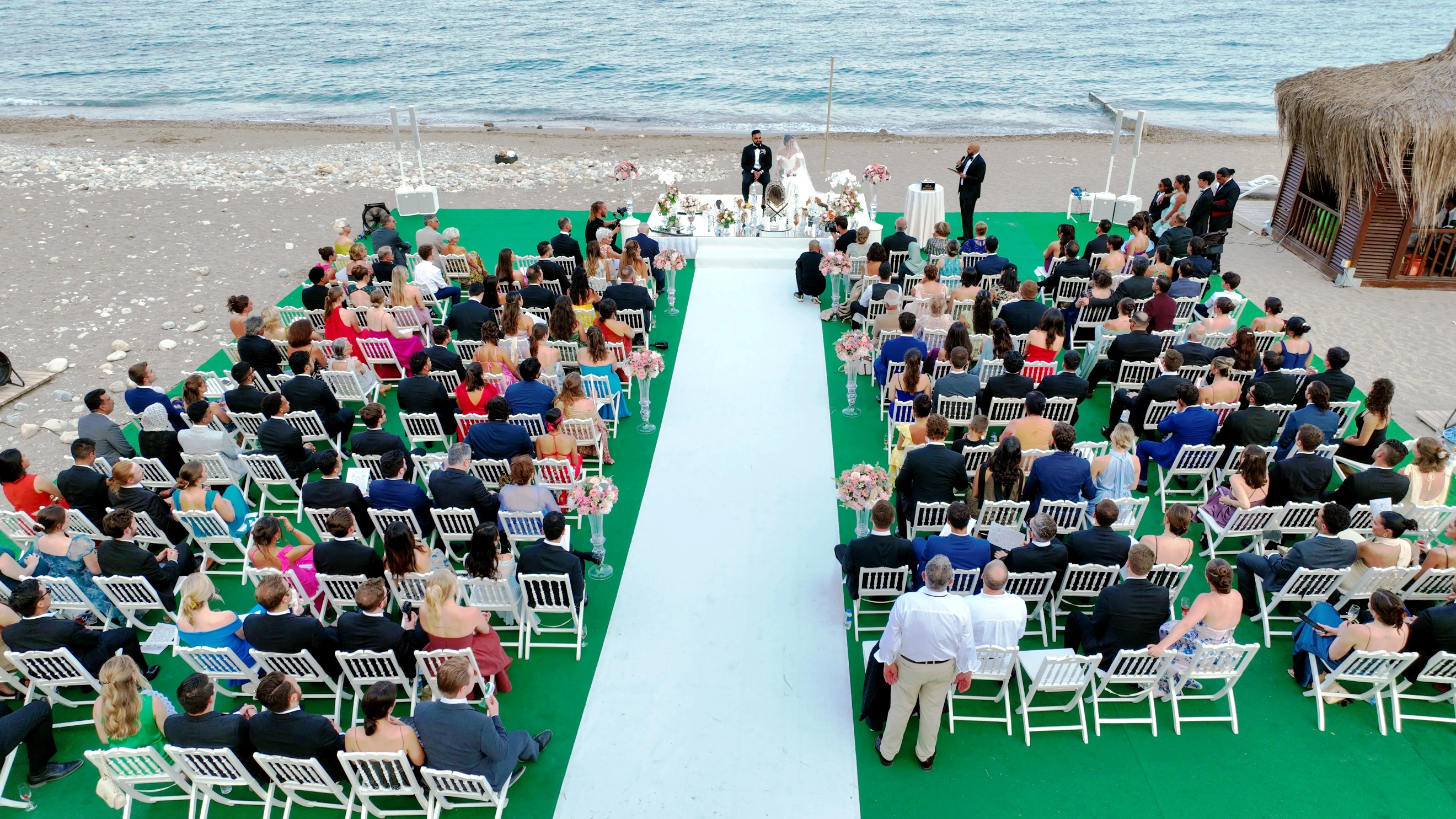
The Aroosi reception component follows different formats than Western wedding receptions, typically featuring specific entertainment sequences, traditional Persian music alongside contemporary songs, particular food service styles including multiple appetizer courses and elaborate rice dishes, and cultural dances like the Raghseh Chagoo (knife dance) that occur at designated moments. Timing these elements requires understanding their cultural significance and coordination skill ensuring smooth flow rather than disjointed event segments.
Language represents another practical challenge for Persian couples planning from abroad. While many second-generation diaspora members speak Persian at home, negotiating contracts, explaining ceremonial details to non-Persian vendors, and managing family communications in multiple languages creates complexity. Parents and older relatives may prefer Persian communication, while couples operate in English, and vendors in Turkey speak Turkish. Without trilingual coordination capability, critical details get lost in translation, potentially compromising ceremonial accuracy or creating family dissatisfaction.
Family involvement in Persian weddings typically exceeds Western norms, with extended families playing active roles in planning decisions, financial contributions, and ceremonial participation. This involvement brings richness to celebrations but also requires diplomatic coordination when family members hold differing opinions about venue selection, ceremonial elements, or budget allocations. Wedding planners serving Persian families must navigate these dynamics respectfully, honoring family input while protecting couple preferences and maintaining planning momentum.
Budget expectations for Persian weddings often differ from typical Western destination weddings. Persian families frequently prioritize generous hospitality, abundant food, quality entertainment, and impressive visual presentation, viewing wedding celebrations as family reputation reflections. This cultural value means Persian weddings may allocate budgets differently than European weddings of similar guest counts, requiring planners who understand these priorities rather than imposing Western budget logic.
Why Turkey Attracts Persian Weddings
Geographic and Cultural Positioning
Turkey's geographic location provides practical advantages for Persian families dispersed across Europe, the United Kingdom, and the Middle East. Turkey's tourism infrastructure and accessibility . make it an increasingly popular destination for international celebrations. Direct flights from London, Paris, Frankfurt, and major European cities reach Istanbul and Antalya in 3-5 hours, making travel manageable for elderly relatives or guests with limited vacation time. Compared to destinations like Thailand, Caribbean islands, or even southern Spain, Turkey offers superior accessibility for guests traveling from multiple countries.
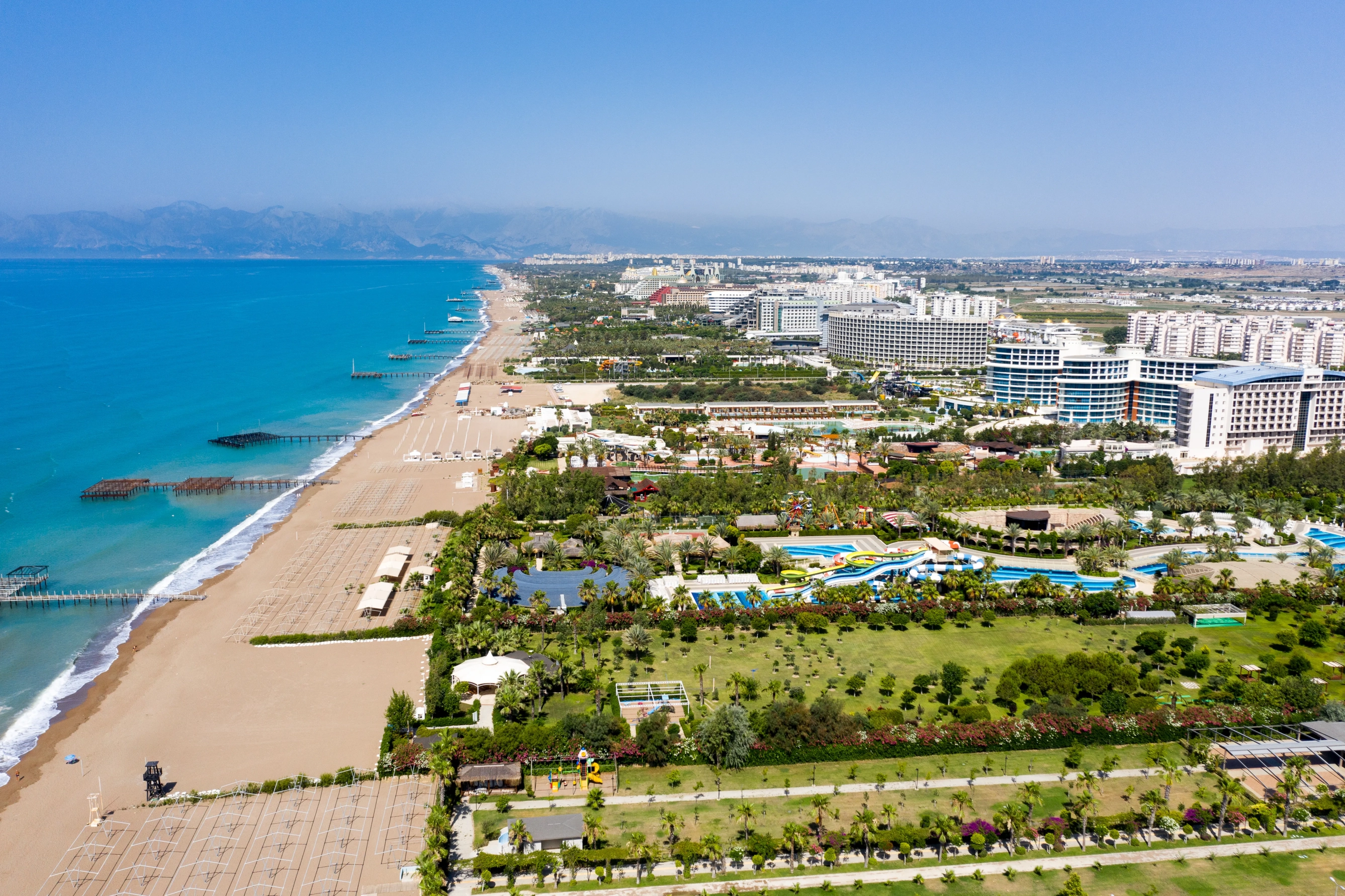
The proximity to Middle Eastern countries including Dubai, Kuwait, and other Gulf states enables participation from Persian family members living throughout the region. Turkey's visa policies for various nationalities, combined with established tourism infrastructure, facilitate international guest arrival without the complications some destinations impose. This accessibility matters significantly for weddings where guest lists span multiple continents and family attendance holds cultural importance.
Cultural familiarity between Turkish and Persian traditions creates comfort for families concerned about religious or cultural appropriateness. While Turkey and Iran maintain distinct identities, historical connections and shared Islamic heritage mean Turkish settings feel culturally acceptable to Persian families in ways some purely Western destinations might not. This cultural bridge enables celebrations that honor tradition while offering Mediterranean beauty and modern amenities.
Turkey's established halal food infrastructure addresses dietary requirements that Persian Muslim families prioritize. Unlike some European destinations where sourcing appropriate catering requires extensive research and compromise, Turkish venues and caterers inherently understand halal requirements, meat preparation standards, and Persian cuisine preferences. Ramarossi's vendor network includes caterers experienced in Persian menu expectations, from specific rice preparation methods to appetizer sequences that match Persian dining customs.
Venue variety in Turkey accommodates different Persian wedding styles, from traditional hotel ballrooms suitable for large guest counts to boutique settings for intimate celebrations, beachfront locations for couples wanting Mediterranean atmosphere, and historical venues providing cultural ambiance. This variety enables Persian couples to find settings matching their vision rather than compromising due to limited options.
Cost comparison with European luxury destinations influences many Persian families' destination wedding decisions. A high-quality 150-person wedding in Antalya, including venue, catering, floral design, entertainment, and professional coordination, typically ranges from €25,000-€40,000 depending on specific selections. Comparable celebrations in London, Paris, or other major European cities often exceed £50,000-€60,000 for similar guest counts and service quality. This cost efficiency enables families to allocate resources toward generous hospitality and quality elements that Persian culture prioritizes.
The Mediterranean climate from May through October provides weather reliability that outdoor-focused Persian weddings require. Sunset timing for Sofreh Aghd ceremonies, outdoor Aroosi receptions, and extended celebrations benefit from consistent weather conditions that unpredictable European climates cannot guarantee. Ramarossi coordinates ceremony timing around optimal sunset windows, understanding the cultural significance of these moments while managing venue logistics and guest comfort.
Ramarossi's Persian Wedding Expertise
Over 100 Ceremonies Coordinated
Ramarossi has coordinated over 100 Persian and Middle Eastern weddings since the company's founding, developing specialized knowledge through repeated experience with ceremonial requirements, family dynamics, and cultural expectations. This expertise distinguishes Ramarossi from general destination wedding planners who may coordinate one or two Persian weddings annually without developing deep cultural understanding.
The learning curve for Persian weddings differs significantly from Western wedding coordination. Understanding Sofreh Aghd symbolism, proper item arrangement, timing significance, and presentation methods requires education beyond standard wedding planning training. Ramarossi's repeated coordination experience has built systematic knowledge of what works practically while honoring tradition which mirror sizes suit different venue spaces, how to source appropriate symbolic items in Turkey, proper candelabra heights for guest sightlines, and dozens of other details that accumulate through extensive experience.
Family relationship management represents another expertise area that Ramarossi has developed through 100-plus Persian weddings. Persian families typically involve parents, grandparents, aunts, uncles, and extended relatives in planning decisions more actively than Western families. Coordinating input from multiple family members, managing differing opinions diplomatically, and ensuring couples maintain decision authority while respecting family involvement requires cultural sensitivity and communication skill. Ramarossi's approach balances family respect with couple advocacy, preventing situations where planning paralysis occurs due to conflicting family preferences.
Vendor education and management for Persian weddings requires specialized coordination. Turkish vendors, while experienced with international weddings, may not inherently understand Persian ceremonial requirements or cultural expectations. Ramarossi planners serve as cultural bridges, explaining to florists why specific Sofreh Aghd items must be arranged precisely, educating photographers about which ceremonial moments require particular attention, and ensuring caterers understand Persian menu expectations and service timing. This vendor education prevents cultural missteps and ensures quality execution.
Ceremonial timing coordination demonstrates Ramarossi's practical expertise. Persian weddings often schedule Sofreh Aghd ceremonies around sunset for symbolic and aesthetic reasons, requiring precise timing coordination with venue lighting, photography schedules, guest transportation, and subsequent reception timing. Ramarossi manages these complex timelines, accounting for seasonal sunset variations, venue-specific logistics, and buffer time for inevitable delays, ensuring ceremonies occur at optimal moments without creating downstream schedule problems.
Understanding Sofreh Aghd Requirements and Symbolism
The Sofreh Aghd ceremony table represents the ceremonial heart of Persian weddings, requiring detailed knowledge for proper execution. Ramarossi coordinates every element of Sofreh Aghd preparation, from sourcing symbolic items to arrangement supervision, ensuring traditional accuracy while adapting to destination wedding contexts.
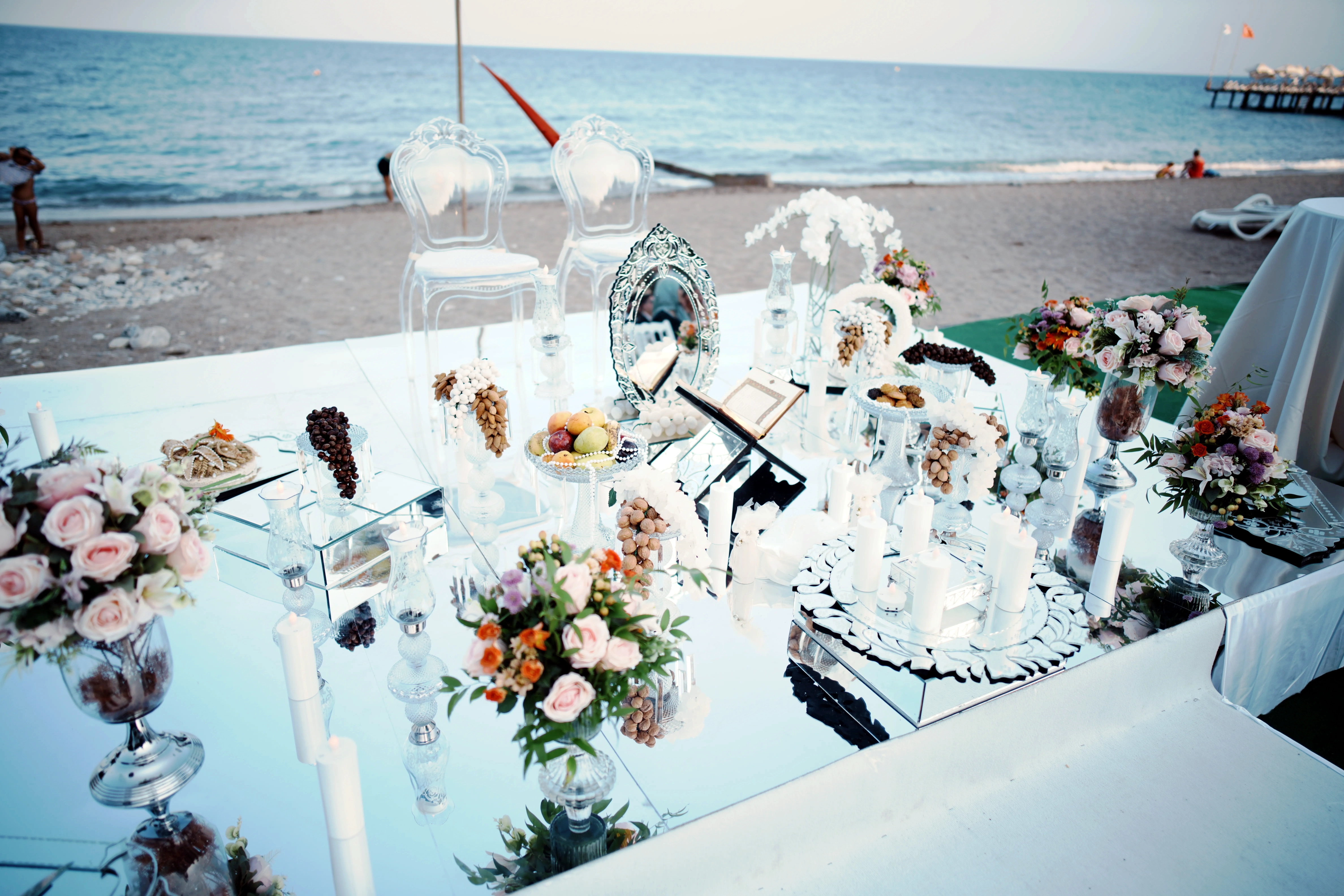
Traditional Sofreh Aghd includes the "Seven Seens"—seven items beginning with the letter "seen" in the Persian alphabet. These traditionally include Sabzeh (sprouted wheat or lentils symbolizing rebirth), Samanu (sweet pudding symbolizing affluence), Senjed (dried oleaster fruit symbolizing love), Sir (garlic symbolizing medicine and health), Sib (apple symbolizing beauty), Somagh (sumac symbolizing sunrise), and Serkeh (vinegar symbolizing patience). Modern couples sometimes substitute items or add contemporary elements while maintaining core symbolism.
Additional essential Sofreh items include a mirror and two candelabras reflecting light and representing brightness in marriage, decorated flatbread (Noon-o-Panir-o-Sabzi), crystallized sugar cones (Kalleh Ghand) that the bride and groom rub together above their heads to sweeten their life, rose water for fragrance, coins symbolizing prosperity, decorated eggs representing fertility, and honey for sweetness. Each item requires appropriate presentation, proper sizing for venue spaces, and aesthetic coordination with overall wedding design.
Ramarossi sources Sofreh Aghd items through established vendor relationships in Turkey and through import arrangements for items unavailable locally. Persian specialty items like proper Samanu or specific symbolic elements may require sourcing from Persian communities or specialty suppliers. Ramarossi manages this procurement, ensuring items arrive in time, meet quality standards, and receive proper presentation.
The physical Sofreh spread—the cloth on which items are arranged—requires appropriate sizing, design aesthetic, and placement logistics. Traditional Persian textiles may be family heirlooms that couples bring from home, or Ramarossi coordinates sourcing appropriate fabrics in Turkey. The spread must be sized correctly for venue spaces, positioned for optimal photography angles and guest visibility, and elevated if necessary for sightline considerations in larger venues.
Mirror and candelabra selection involves practical considerations beyond symbolism. Mirrors must be sized appropriately—large enough for visual impact but not so oversized that they dominate small venue spaces. Candelabras require stable bases preventing tipping hazards, appropriate height for aesthetic proportion, and flame management solutions for venues with wind exposure or fire safety restrictions. Ramarossi coordinates these practical elements while maintaining traditional appearance.
Sugar cone rubbing (Kalleh Ghand) creates logistical considerations that Ramarossi manages. Holding large sugar cones above heads requires structural stability, appropriate timing within ceremonies, and protective measures preventing sugar spillage on wedding attire. Ramarossi coordinates with vendors creating structurally sound sugar cones, manages timing so this moment occurs optimally for photography, and provides protective elements ensuring couples' clothing remains protected.
The ceremonial cloth held above couples' heads while female relatives rub sugar cones requires coordination with family members willing to perform this role, appropriate fabric selection, timing coordination with other ceremony elements, and positioning that doesn't obstruct photographer or videographer angles. Ramarossi manages these logistics, briefing family members on timing and positioning so this traditional element executes smoothly.
Aroosi Reception Traditions and Execution
The Aroosi reception the celebratory portion following Sofreh Aghd involves distinct Persian entertainment traditions, food service patterns, and guest participation elements that differ from Western wedding receptions. Ramarossi coordinates these elements based on extensive experience understanding how Persian reception traditions translate into destination wedding venues.
Entertainment pacing for Persian receptions typically differs from Western weddings. Persian celebrations often feature extended periods of traditional Persian music and dancing, with specific song types occurring at designated moments rather than continuous DJ mixing. Older guests may prefer classic Persian songs from particular eras, while younger guests want contemporary Iranian pop or Western music. Ramarossi coordinates with entertainment vendors understanding these preferences, creating playlists or live music setlists that balance generational expectations and maintain energy flow.
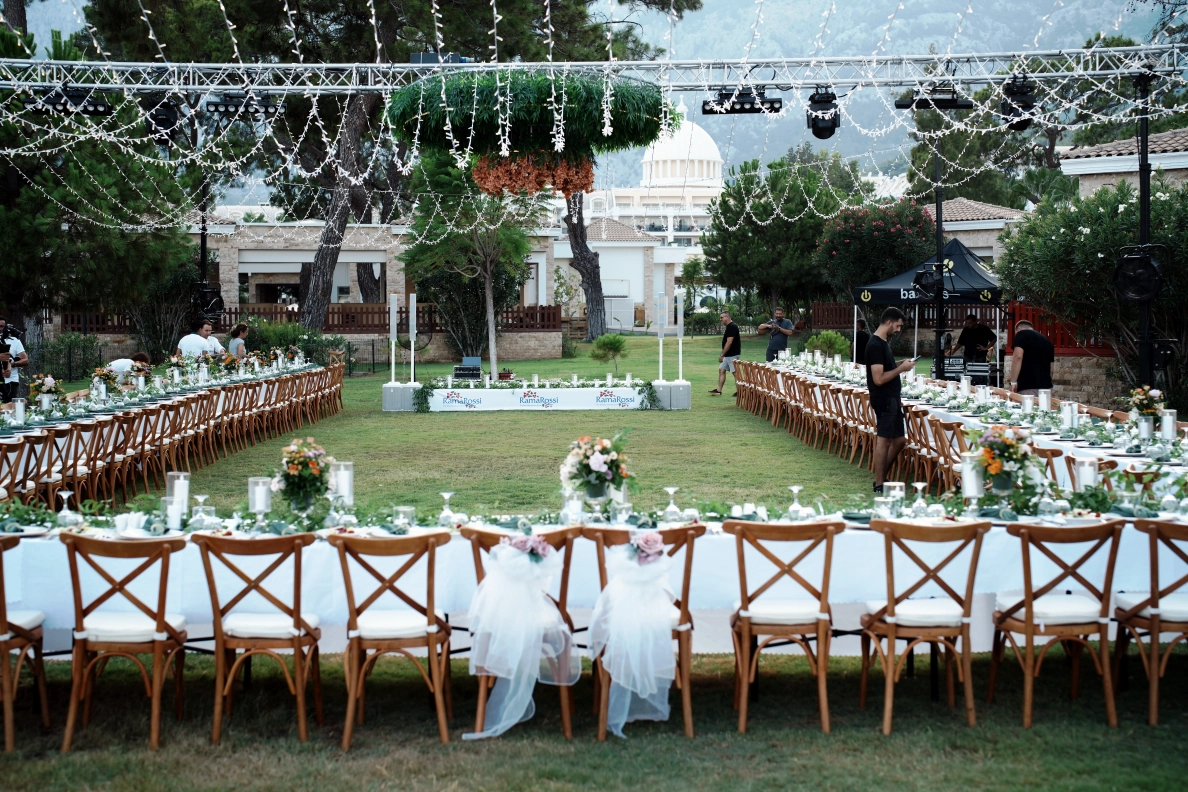
The Raghseh Chagoo (knife dance) represents a traditional entertainment moment where guests dance around the wedding cake holding money or envelopes, eventually "paying" the couple for the privilege of cutting the cake. This tradition requires timing coordination, guest education for non-Persian attendees unfamiliar with the custom, music coordination, and space management in venues where cake tables may be positioned for different traffic flow than this tradition requires. Ramarossi coordinates these logistics, ensuring this cultural moment occurs smoothly and inclusively for mixed-heritage guest lists.
Persian wedding food service typically involves more elaborate appetizer courses than Western receptions, often featuring multiple passed appetizer types, substantial appetizer tables, or sit-down appetizer courses before main dinner service. Rice dishes hold particular importance in Persian cuisine, with expectations for quality preparation, presentation, and variety that exceed typical Western wedding catering. Ramarossi coordinates with caterers experienced in Persian menu expectations, ensuring appropriate food quality, service pacing, and presentation standards.
Specific Persian dishes that families may request include various rice preparations (Chelow, Polo), kebab varieties, stews (Khoresht), appetizers like Dolmeh or Kuku, and desserts including Bastani (Persian ice cream) or various pastries. Not all Turkish caterers inherently understand Persian cuisine nuances, so Ramarossi's vendor network includes caterers with proven Persian menu capability or coordinates with Persian specialty caterers when specific menu requirements demand it.
Timing for Persian receptions often extends longer than typical Western weddings, with celebrations frequently continuing past midnight or into early morning hours. This extended timeline requires venue coordination ensuring sufficient rental periods, vendor staffing for extended hours, and guest transportation arrangements accommodating late departures. Ramarossi negotiates these extended timelines with venues, manages vendor overtime if necessary, and coordinates guest logistics for celebrations extending beyond typical event windows.
Alcohol service for Persian Muslim families requires sensitive handling. Some Persian families prefer completely alcohol-free celebrations respecting Islamic principles, while others allow alcohol service for non-Muslim guests. Ramarossi navigates these preferences diplomatically, coordinating with venues on appropriate beverage service, ensuring family religious preferences are respected while accommodating diverse guest expectations when appropriate.
Multi-Day Persian Wedding Coordination
Traditional Persian weddings often involve multiple events spanning several days, creating destination wedding logistics more complex than single-day celebrations. Ramarossi coordinates multi-day Persian wedding weekends including pre-wedding events, the main ceremony and reception, and post-wedding gatherings when families request comprehensive coordination.
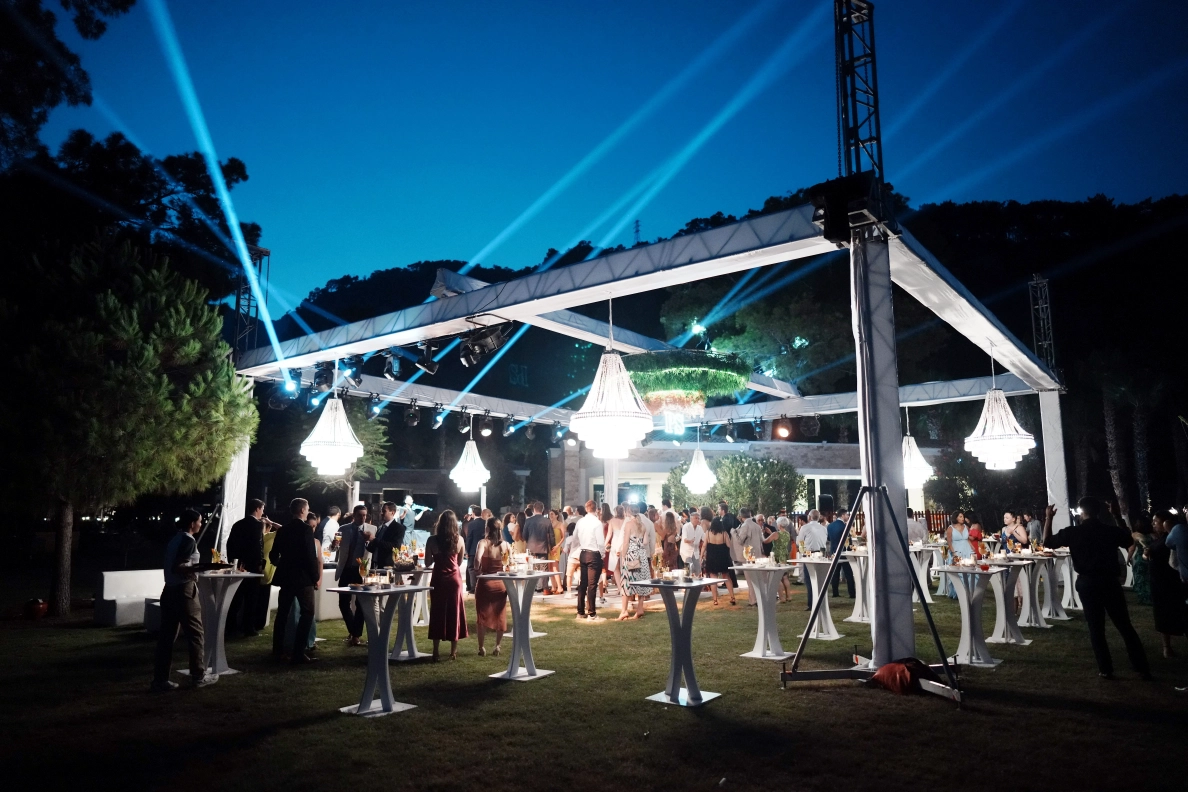
The Henna Night (Hanabandoon) represents a traditional pre-wedding celebration, particularly common for families with Middle Eastern connections beyond Iran. This event typically occurs one or two nights before the main wedding, involving henna application to the bride's hands, traditional music and dancing, and gathering of female family and friends. Ramarossi coordinates Henna Night events when families request this tradition, managing venue selection for more intimate gatherings, henna artist sourcing, entertainment coordination, and timing that doesn't conflict with other wedding weekend activities.
Mehmooni (pre-wedding party) serves as another common event in multi-day Persian wedding celebrations, functioning similarly to Western rehearsal dinners but often including extended family and close friends beyond just wedding party members. Ramarossi coordinates Mehmooni logistics including venue selection appropriate for these gatherings, catering that may be more casual than main reception meals, entertainment if desired, and timing coordination with other weekend events.
Main wedding day coordination for multi-day celebrations requires even more precise timeline management, ensuring couples and families aren't exhausted from previous events, allowing appropriate preparation time, and pacing the day so energy peaks during evening celebrations rather than depleting early. Ramarossi's multi-day coordination includes rest period management, staggered family coordination calls, and timeline buffers ensuring main wedding days don't feel rushed despite packed weekend schedules.
Post-wedding brunches or gatherings represent the final element many multi-day Persian weddings include, giving families additional celebration time before guests depart Turkey. Ramarossi coordinates these events when requested, typically involving more casual restaurant reservations or hotel brunch arrangements rather than full event production, but still requiring guest communication, dietary accommodation, and transportation coordination.
Guest accommodation management for multi-day weddings involves more complex hotel coordination, as guests need lodging for 3-4 nights rather than single night stays. Ramarossi negotiates extended group rates, manages room block allocations across multiple nights, coordinates check-in and check-out timing around different event schedules, and communicates hotel information clearly so guests understand multi-day lodging requirements.
Transportation logistics multiply for multi-day celebrations, requiring shuttle services or transportation arrangements for multiple events across multiple days rather than single ceremony and reception transportation. Ramarossi coordinates these transportation schedules, ensuring guests can move between hotels and various event venues across the weekend without confusion or delays.
Budget management for multi-day Persian weddings requires transparent communication about cumulative costs. Families accustomed to single-day wedding budgets may not realize that multi-day celebrations involving multiple venues, extended vendor coordination, and additional catering substantially increase total investment. Ramarossi provides clear budget breakdowns showing costs for each event component, enabling families to make informed decisions about which elements to include based on budget priorities.
Blending Persian and Western Traditions
Mixed-Heritage Couple Coordination
Increasing numbers of Persian weddings Ramarossi coordinates involve mixed-heritage couples where one partner has Persian background and the other has British, European, or other Western heritage. These weddings require particular cultural sensitivity, balancing Persian traditions with Western expectations while ensuring both families feel represented and respected.
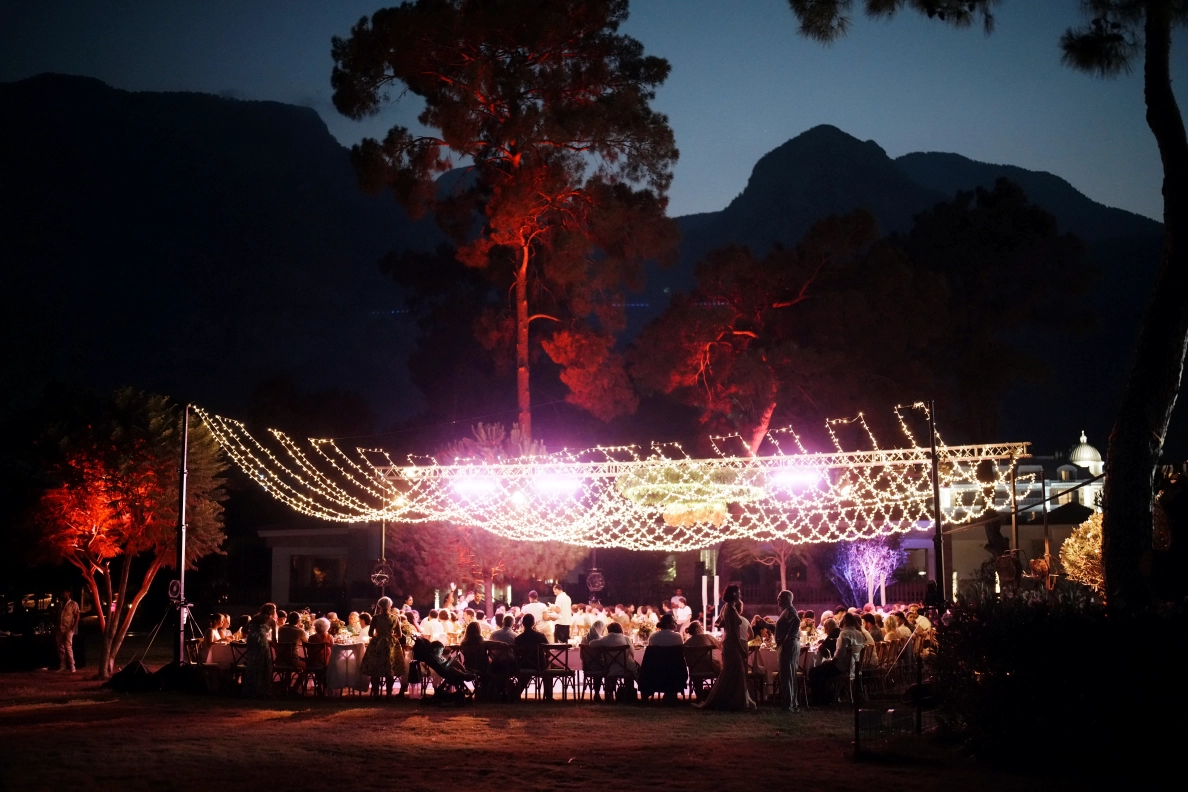
Ceremony structure for mixed-heritage couples often involves creative integration of both cultural traditions. Some couples schedule separate Persian Sofreh Aghd ceremonies and Western-style ceremonies on the same day, allowing each tradition proper attention without compression or compromise. Ramarossi coordinates these dual-ceremony formats, managing timing so ceremonies don't feel rushed, allowing venue transitions if ceremonies occur in different spaces, and educating each family side about the other's traditions so everyone appreciates rather than feels confused by unfamiliar elements.
Other mixed-heritage couples prefer integrated ceremonies combining Persian and Western elements within single unified ceremonies. This approach might include Sofreh Aghd table presentation alongside Western vow exchanges, traditional Persian music interspersed with Western processional selections, or bilingual ceremony components honoring both cultures. Ramarossi coordinates these integrated approaches, ensuring seamless flow despite different ceremonial traditions and helping couples identify which elements from each culture hold most meaning for inclusion.
Reception format for mixed-heritage weddings often blends Persian and Western entertainment, food service, and celebration patterns. Dance floor music might transition between Persian and Western songs, food service might include both Persian dishes and Western menu options, and celebration traditions like the knife dance might occur alongside Western traditions like bouquet tosses. Ramarossi manages these blended receptions, creating flow that feels cohesive rather than disjointed, and ensuring timing allows appropriate attention to each cultural element.
Family education represents a crucial coordination element for mixed-heritage weddings. Persian family members unfamiliar with Western wedding traditions benefit from explanation of elements like first dances, toasts, or specific reception timing patterns, while Western family members appreciate education about Sofreh Aghd symbolism, Persian entertainment traditions, or food service customs. Ramarossi provides this cultural education through pre-wedding communications, day-of explanation when appropriate, and program notes when couples want written cultural context.
Guest communication for mixed-heritage weddings requires clarity about what to expect, particularly for guests unfamiliar with certain cultural traditions. Ramarossi helps couples create informational materials explaining ceremonial elements, appropriate attire guidance when cultural dress codes differ, and timeline information helping guests understand celebration pacing. This proactive communication prevents confusion and helps all guests participate comfortably regardless of cultural familiarity.
Language navigation for mixed-heritage celebrations involves managing ceremonies and receptions where different guest groups speak different primary languages. Some couples prefer bilingual ceremony components with Persian and English sections, while others conduct ceremonies primarily in one language with translation materials. Ramarossi's trilingual team capability enables seamless coordination across Persian, English, and Turkish communications, ensuring vendors, families, and guests all receive information in appropriate languages.
Language Advantage: Persian-Speaking Coordination
Trilingual Communication Capability
Ramarossi's Persian language fluency among the planning team eliminates communication barriers that complicate destination wedding planning for Persian couples working with non-Persian-speaking planners. The team's fluency in Persian, English, and Turkish creates seamless coordination across all wedding stakeholders without translation delays or miscommunication risks.
Direct Persian communication with couples and families prevents misunderstandings that translation-dependent coordination can create. Complex discussions about ceremonial details, family dynamics, budget priorities, or design preferences benefit from direct communication rather than explanations filtered through imperfect translation. Persian-speaking couples frequently express relief at working with planners who understand them directly, eliminating the exhaustion of constantly explaining cultural context or translating family conversations.
Family coordination in Persian becomes particularly valuable when older relatives who prefer Persian communication play active roles in planning. Parents or grandparents who feel uncomfortable communicating in English can discuss preferences, concerns, or questions directly with Ramarossi planners without requiring couples to serve as translators. This direct communication strengthens family confidence in planning and reduces couple stress managing between planner communications and family involvement.
Vendor coordination benefits from Turkish fluency ensuring instructions to Turkish vendors remain accurate and complete. When Ramarossi planners explain Persian ceremonial requirements to Turkish florists, photographers, or caterers, fluent Turkish communication prevents details from getting lost in translation. Complex vendor instructions about Sofreh Aghd setup, specific timing requirements, or particular service patterns communicate clearly when delivered in vendors' native language.
The trilingual capability enables real-time translation during wedding weekends when Persian family members, English-speaking guests, and Turkish vendors all need coordination. Rather than couples managing translation responsibilities during their celebration, Ramarossi planners serve as translators ensuring smooth communication across language groups. This service proves particularly valuable during rehearsals, vendor setup, or when unexpected situations require immediate multilingual coordination.
Contract and documentation in appropriate languages provides clarity and legal protection. Persian couples appreciate receiving certain documents or communications in Persian when that's their preferred language, while maintaining English versions for official contracts. Turkish vendor contracts require fluent Turkish comprehension ensuring terms and conditions are properly understood and negotiated. Ramarossi manages documentation across these languages, ensuring couples understand what they're signing and vendors receive clear specifications.
Cultural nuance communication differs from literal translation, and Persian fluency enables Ramarossi planners to understand subtleties that pure translation might miss. Indirect communication styles, family hierarchy implications, or cultural references that Persian speakers understand implicitly but might confuse non-Persian speakers are navigated naturally when planners share cultural background. This cultural fluency prevents misunderstandings and builds trust with Persian families evaluating whether planners truly understand their traditions.
Vendor Network Familiar with Persian Requirements
Established Relationships with Cultural Competence
Ramarossi's 15-year presence coordinating Persian weddings has built a vendor network experienced with Persian ceremonial requirements, cultural expectations, and specific service needs. This specialized vendor network distinguishes Ramarossi's capability from planners who source vendors ad hoc for each wedding without established Persian-experienced relationships.
Florists in Ramarossi's network understand Sofreh Aghd arrangements, proper symbolic item presentation, and aesthetic standards Persian families expect. Rather than educating florists about Sofreh Aghd elements for each wedding, Ramarossi works with florists who have executed these arrangements multiple times, understand proper sizing and proportion, and can source appropriate symbolic items efficiently. This established expertise ensures consistent quality and eliminates learning-curve mistakes.
Photographers and videographers experienced with Persian weddings understand which ceremonial moments require particular attention, optimal angles for Sofreh Aghd photography, timing patterns for Persian receptions, and family dynamics typical in Persian celebrations. Capturing the sugar cone rubbing moment, documenting Sofreh Aghd details comprehensively, timing photography around extended reception celebrations, and navigating large family portrait coordination all benefit from photographer experience with Persian wedding patterns.
Catering partners familiar with Persian cuisine expectations deliver appropriate food quality, preparation methods, and service pacing without requiring extensive education about Persian dining customs. Rice preparation quality—critically important in Persian cuisine—requires specific technique and presentation that not all caterers master without experience. Ramarossi's catering network includes partners who understand these requirements or specializes in Persian cuisine when menu specifications demand it.
Entertainment vendors including DJs and live musicians with Persian music libraries and experience with Persian wedding entertainment patterns provide appropriate music selection and pacing. Persian receptions feature different energy patterns than Western receptions, with specific song types holding cultural significance and generations preferences requiring sensitive balancing. Entertainment vendors in Ramarossi's network understand these patterns from repeated experience rather than learning through individual wedding trial and error.
Beauty service providers understanding Persian beauty aesthetics and preferences ensure hair and makeup align with cultural standards. Persian bridal makeup often involves specific aesthetic preferences regarding coverage, drama, and style that differ from European minimalist trends. Beauty providers in Ramarossi's network understand these preferences and have experience creating looks Persian families appreciate.
Venue relationships include understanding from venue staff about Persian wedding patterns, extended celebration timing, specific setup requirements for Sofreh Aghd presentations, and accommodation of cultural preferences regarding things like alcohol service or food preparation standards. Venues that have hosted multiple Persian weddings through Ramarossi coordination understand what to expect and can provide appropriate service without surprise or resistance to unfamiliar requirements.
This vendor network represents years of relationship building, vetting, and repeated collaboration. Ramarossi doesn't source vendors fresh for each Persian wedding—instead drawing from established relationships where vendors understand expectations, deliver consistent quality, and maintain accountability through ongoing business relationships. This network stability provides quality assurance that couples planning internationally cannot achieve through independent vendor research.
Case Studies: Successful Persian Weddings Ramarossi Coordinated
Case Study 1: London-Based Persian Couple - Beach Wedding (180 Guests)
Nazanin and Arash, both born in Iran but raised in the United Kingdom, wanted a destination wedding celebrating their Persian heritage while offering their British friends an experience beyond London. With 180 guests including family from Iran, relatives across Europe, and friends from their London social circle, they needed comprehensive coordination managing international logistics and cultural blending.
Their challenge involved balancing Nazanin's mother's expectations for traditional Sofreh Aghd with their desire for a contemporary beachfront setting. Additionally, many British guests had never experienced Persian weddings and needed cultural context to participate meaningfully. Budget considerations involved managing costs for a large guest count while maintaining quality standards both families expected.
Ramarossi coordinated a beachfront resort wedding with Sofreh Aghd ceremony timed at sunset, followed by an Aroosi reception blending Persian and Western entertainment. The solution involved creating an elevated platform for the Sofreh Aghd table ensuring beach guests could view ceremonial elements clearly, coordinating with resort chefs on Persian menu additions to standard catering offerings, and creating cultural guide cards for tables explaining Persian traditions to British guests unfamiliar with these customs.
Transportation coordination required managing airport shuttles for international arrivals spanning three days, as guests from Iran, various European cities, and London arrived on different flights. Ramarossi coordinated welcome bags with weekend itineraries, local information, and cultural tradition explanations helping British guests understand what to expect.
The outcome included a seamlessly executed three-day wedding weekend where Persian traditions received proper honor while British guests felt included and engaged rather than confused. Nazanin's parents expressed satisfaction with ceremonial accuracy, while Arash's British friends reported the celebration was the most memorable wedding they'd attended. The couple's feedback emphasized relief at having Persian-speaking coordination eliminating the stress of translating family conversations and cultural expectations throughout planning.
Case Study 2: German-Persian Mixed Heritage Wedding (120 Guests)
Sara, of Persian heritage but born and raised in Germany, married Michael, a German national with no Middle Eastern background. Their wedding required particular cultural sensitivity ensuring Sara's family traditions received appropriate representation while Michael's family felt equally included in unfamiliar ceremonial contexts.
The planning challenge involved Michael's parents' initial concern about unfamiliar traditions and whether a Turkish destination wedding would accommodate German guests comfortably. Sara's parents wanted traditional Sofreh Aghd but recognized the need for cultural explanation helping Michael's family appreciate rather than feel alienated by Persian elements.
Ramarossi coordinated a boutique hotel wedding featuring an integrated ceremony combining Persian Sofreh Aghd with Western vow exchanges, creating a unified ceremony rather than separate cultural events. The approach involved detailed pre-wedding communication with both families explaining how traditions would be integrated, creating a bilingual ceremony program with Persian and German sections explaining cultural elements, and coordinating a Mehmooni the night before where families could interact informally before the formal wedding.
Vendor coordination required sourcing traditional Sofreh Aghd elements while working with a venue more accustomed to European weddings. Ramarossi planners educated venue staff about Persian ceremonial requirements, coordinated Persian food options alongside German menu preferences, and created a reception entertainment plan alternating between Persian music, German favorites, and international selections.
The outcome successfully bridged both cultures, with Michael's parents reporting they felt welcomed and educated about Persian traditions rather than excluded, while Sara's family expressed satisfaction that their cultural heritage received proper honor in a mixed-heritage context. The couple emphasized Ramarossi's cultural sensitivity and trilingual team capability as critical factors enabling smooth coordination between German-speaking and Persian-speaking families.
Case Study 3: Dubai-Based Persian Family - Luxury Multi-Day Celebration (200 Guests)
A Persian family based in Dubai planned their daughter's wedding as a multi-day luxury celebration bringing together relatives from Iran, Dubai, London, Los Angeles, and other international locations. With a substantial budget and high expectations for hospitality reflecting family status, they required coordination demonstrating luxury service standards alongside Persian cultural expertise.
The challenge involved coordinating multiple events across four days—Henna Night, Mehmooni, main wedding day with Sofreh Aghd and Aroosi, and post-wedding brunch—while managing logistics for 200 guests requiring accommodation, transportation, and activity coordination across the extended weekend. The family's expectations included premium quality in every element while maintaining traditional cultural accuracy.
Ramarossi coordinated a luxury resort wedding featuring elaborate Sofreh Aghd with custom-designed elements, premium floral arrangements throughout all venues, live Persian music ensemble for the reception, and comprehensive guest services including concierge coordination for guest activities during free time. The multi-day format required precise timeline management ensuring events flowed smoothly without exhausting the couple or guests before the main celebration.
Vendor coordination required sourcing premium suppliers meeting the family's luxury standards while ensuring cultural competence with Persian requirements. Ramarossi's approach involved presenting vendor portfolios demonstrating both luxury capability and Persian wedding experience, negotiating comprehensive service packages across multiple days, and maintaining quality control through rehearsals and setup supervision.
The family's extensive guest list from multiple countries required complex logistics including VIP airport services for elderly relatives, multiple accommodation blocks across different resort sections, and coordinated transportation schedules moving guests between venues for different events. Ramarossi managed these logistics comprehensively, providing dedicated coordinators managing guest services throughout the weekend.
The outcome delivered a celebration meeting the family's luxury expectations while honoring Persian traditions appropriately. The bride's parents specifically noted Ramarossi's ability to manage demanding logistics and family dynamics diplomatically, maintaining couple focus while accommodating extensive family involvement. Post-wedding feedback from guests highlighted seamless coordination across four days of celebrations.
Why Persian Families Trust Ramarossi Specifically
Cultural Understanding Beyond Basic Coordination
Persian families evaluating wedding planners distinguish between coordinators who can execute vendor logistics and planners who truly understand Persian cultural values, family dynamics, and ceremonial significance. Ramarossi's appeal to Persian families stems from demonstrated cultural competence that extends beyond checklist coordination into genuine understanding of what Persian weddings represent to families.
The value Persian families place on hospitality—ensuring guests experience generous food, quality entertainment, and memorable experiences—aligns with Ramarossi's planning philosophy prioritizing guest experience alongside couple vision. Understanding this cultural value means Ramarossi planners don't recommend budget cuts that compromise hospitality quality, recognizing that Persian families view wedding celebrations as family reputation reflections requiring appropriate investment.
Respect for family involvement distinguishes Ramarossi's approach from Western planners who might resist extensive family input. Persian family dynamics typically involve more collective decision-making than individualistic Western approaches, with parents, grandparents, and extended family playing active roles. Ramarossi navigates this involvement diplomatically rather than viewing it as interference, understanding cultural context while maintaining couple decision authority.
Ceremonial knowledge depth provides confidence to families concerned about accuracy in destination settings far from Persian communities where cultural knowledge is readily available. Knowing that Ramarossi has coordinated over 100 Persian weddings, understands Sofreh Aghd symbolism deeply, and can source appropriate ceremonial elements in Turkey provides reassurance that traditions will be honored properly rather than approximated by planners learning Persian customs for the first time.
The Persian language capability among Ramarossi's team creates trust through direct communication without translation barriers. Persian families frequently express relief and confidence when discovering they can communicate directly in Persian, eliminating concerns about cultural nuances getting lost in translation or having to repeatedly explain Persian context to non-Persian-speaking planners.
Track record and community reputation within Persian diaspora networks influence planning decisions significantly. Persian families rely heavily on community referrals and reputation when selecting wedding vendors, viewing personal recommendations from other Persian families as more trustworthy than general online reviews. Ramarossi's established reputation within Persian communities across Europe and the Middle East, built through successful weddings and satisfied family referrals, creates trust that advertising or marketing cannot replicate.
The specialized focus on Persian weddings rather than treating them as occasional diversity in primarily Western wedding businesses signals commitment and expertise. Persian families appreciate working with planners who view Persian weddings as core specialization rather than occasional accommodations, ensuring cultural elements receive proper priority and attention rather than being afterthoughts in primarily Western-focused planning practices.
Conclusion
Persian and Middle Eastern couples consistently select Ramarossi for Turkish destination weddings based on specialized cultural expertise that generic destination wedding planners cannot match. The combination of over 100 Persian weddings coordinated, Persian language fluency among the planning team eliminating communication barriers, deep understanding of Sofreh Aghd ceremonial requirements and Aroosi reception traditions, established vendor network experienced with Persian cultural expectations, and demonstrated capability managing complex family dynamics creates a service delivery model specifically designed for Persian wedding needs.
Turkey's appeal as a Persian wedding destination—combining geographic accessibility for international guests, cultural familiarity that bridges Eastern and Western traditions, Mediterranean beauty, and cost advantages compared to European luxury destinations—makes it an increasingly popular choice for Persian diaspora families. Ramarossi's Antalya presence, combined with Istanbul coordination capability, positions the company to serve Persian couples seeking Turkish destination celebrations with the confidence that their cultural traditions will be honored accurately while delivering the luxury destination wedding experience they envision.
The challenges Persian couples face when planning destination weddings—balancing traditional family expectations with contemporary preferences, navigating language barriers, coordinating international guest logistics, and ensuring ceremonial accuracy far from Persian community resources—require specialized planning expertise rather than generic coordination. Ramarossi's 15-year evolution developing this expertise, building appropriate vendor relationships, and establishing reputation within Persian diaspora communities explains why Persian families researching wedding planners in Turkey consistently identify Ramarossi as the specialized choice for culturally competent coordination.
For Persian couples evaluating whether Ramarossi's approach aligns with their wedding vision, initial consultations provide opportunity to discuss specific cultural requirements, family dynamics, ceremonial preferences, and budget considerations. These conversations can be conducted in Persian, English, or both, ensuring comfortable communication from the first interaction. Ramarossi's proven track record coordinating Persian weddings across spectrum from intimate family celebrations to large luxury multi-day events demonstrates capability serving diverse Persian couple preferences and family expectations. Contact Ramarossi directly to schedule a complimentary consultation and discuss your Turkish destination wedding vision.